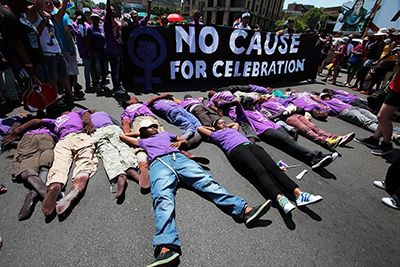
Image : Heather Mason
Article by Sarah-Ann Moore
“I am black and I am gay. I cannot separate the two into secondary or primary struggles” - Simon Nkoli
In recent years, South African Pride events have been the subject of much criticism. While not wishing to dismiss the possible value of such events, the following discussion will seek to demonstrate some of the ways in which the neoliberal, assimilationist political agenda currently dominating LGBTIQ+ movements in South Africa fails to subvert heteronormative and homonormative systems of power. Recent events have prompted such a discussion, most notably the disruption of the 2012 Joburg Pride parade, where activist organisation One in Nine aimed to disrupt the parade in order to protest systemic violence targeting black lesbians in South Africa - calling for one minute of silence for black, queer victims of violence (Hengeveld & Tallie, 2012; Tallie, 2014). This protest was met with animosity and violence from the predominantly white parade attendees (Hengeveld & Tallie, 2012). Such events speak to the contested nature of Pride as a site of protest and celebration in and around queer communities. Similar tensions surrounding Pride, its history, and its evolution in South Africa will be explored, with the view to interrogate how such events may illustrate the conflict between heteronormative and homonormative precepts, and subversive political engagement.
The politics of identity feature prominently within LGBTIQ+ movements and are often closely associated with notions of community. Notably, the concept of a ‘community’ identity is strongly promoted in the rhetoric of Pride (Craven, 2012). However, if a community is understood as a group characterised by shared experience, shared oppression, and collective needs and interests, such a group becomes increasingly difficult to identify (Craven, 2012). Although certain discursive moves have been undertaken in an attempt to accommodate such limitations (observed, for example, in the modifications the acronym LGBTIQ+ has undergone over time), notions of community nevertheless maintain principles of inclusion and exclusion, as evidenced by some of the tensions characterising Pride (Craven, 2012). As such, it is necessary to mediate between a need for unity and an appreciation of difference. Such mediation becomes particularly vital in relation to groups that face high levels of discrimination and marginalisation (Craven, 2012).
Access the full article here: Asserting Difference, Asserting Sameness: Heteronormativity, Homonormativity, and Subversion in South African Pride Events
